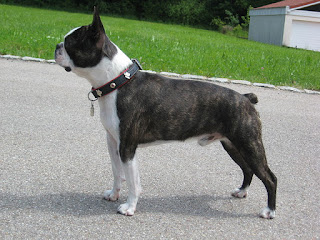The Boston Terrier is a breed of dog originating in the United
States. This "American Gentleman" was accepted in 1893 by the
American Kennel Club as a non-sporting breed. Color and markings are important
when distinguishing this breed to the AKC standard. They should be either
black, brindle or seal with white markings. Bostons are small and compact with
a short tail and erect ears. The AKC says they are highly intelligent and very
easily trained. They are friendly and can be stubborn at times. The average
life span of a Boston is around 11 to 13 years, though some can live well into
their teens.
The
American Kennel Club ranked the Boston Terrier as the 21st most popular breed
in 2016.
Description
The
Boston Terrier is a compactly built, well-proportioned dog. It has a
square-looking head with erect ears and a slightly arched neck. The muzzle is
short and generally wrinkle-free, with an even or a slightly undershot bite.
The chest is broad and the tail is short. According to international breed
standards, the dog should weigh no more than 25 pounds (11 kg). Boston Terriers
usually stand up to 15-17 inches at the withers.
The
American Kennel Club divides the breed into three classes: under 15 pounds, 15
pounds and under 20 pounds, 20 pounds and not exceeding 25 pounds.
Coat and color
The
Boston Terrier is characteristically marked with white in proportion to either
black, brindle, seal (color of a wet seal, a very dark brown that looks black
except in the bright sun), or a combination of the three. Any other color is
not accepted as a Boston Terrier by the American Kennel Club, as they are
usually obtained by crossbreeding with other breeds and the dog loses its
characteristic "tuxedo" appearance.
According
to the American Kennel Club, an ideal Boston Terrier should have white that
covers its chest, muzzle, band around the neck, halfway up the forelegs, up to
the hocks on the rear legs, and a white blaze between (but not touching) the
eyes. For conformation showing, symmetrical markings are preferred. Due to the
Boston Terrier's markings resembling formal wear, in addition to its refined
and pleasant personality, the breed is commonly referred to as the
"American Gentleman."
Behavior
Boston
is a gentle breed that typically has a strong, happy-go-lucky, and friendly
personality with a merry sense of humour. Bostons are generally eager to please
their owner and can be easily trained. They can be very protective of their
owners, which may result in aggressive and territorial behavior toward other
pets and strangers. The breed requires only a minimal amount of grooming.
While
originally bred for fighting as well as hunting rats in garment factories, they
were later down bred for companionship. They are not considered terriers by the
American Kennel Club, however, but are part of the non-sporting group.
Both
females and males are generally quiet and bark only when necessary, though early
training in this regard is essential. Their usually sensible attitude towards
barking makes them excellent choices for apartment dwellers. They enjoy being
around people, get along well with children, the elderly, other canines, and
non-canine pets, if properly socialized.
Health
Curvature
of the back, called roaching, might be caused by patella problems with the rear
legs, which in turn causes the dog to lean forward onto the forelegs. This
might also just be a structural fault with little consequence to the dog. Many
Bostons cannot tolerate excessive heat and also extremely cold weather, due to
the shortened muzzle, so hot or cold weather combined with demanding exercise
can bring harm to a Boston Terrier. A sensitive digestive system is also
typical of Boston Terriers. In the absence of good quality, proper diet,
flatulence is associated with the breed. Their large and prominent eyes make
Boston Terriers prone to corneal ulcers.
Bostons
are brachycephalic breeds. The word comes from Greek roots "Brachy,"
meaning short and "cephalic," meaning head. This anatomy can cause
tiny nostrils, long palates and a narrow trachea. Bostons may be prone to
snoring and reverse sneeze—a rapid and repeated forced inhalation through the
nose—accompanied by snorting or gagging sounds used to clear the palate of
mucus, which does not harm the dog in any way. Brachycephalic dogs may be prone
to complications with general anesthesia. Bostons frequently require caesarean
section to give birth, with over 90% of litters in a UK Kennel Club survey
delivered this way.
Uses
In
the past, Bostons were primarily pit-fighting dogs, but with their friendly and
happy temperament they became a companion and rat hunter.
In
modern days, aside from being an excellent companion, the Boston Terrier also
excels in all sorts of canine sports. The breed is increasingly popular in dog
agility competitions, obedience training, rally obedience, tracking, dock
diving, flyball, weight-pulling, barn hunt and lure coursing. Being such a
versatile breed and with their outgoing personality and eagerness to meet new
acquaintances, the Boston Terrier is a popular therapy dog.






No comments:
Post a Comment